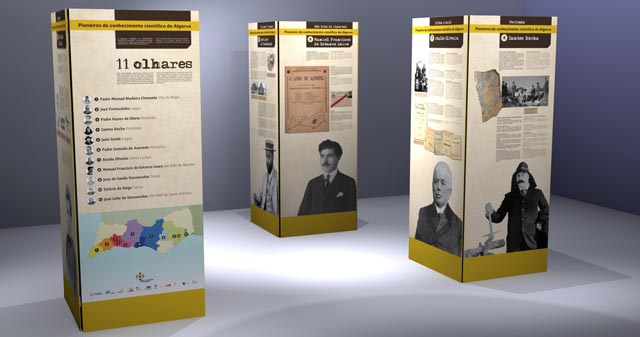 Between 6 June and 15 July, the Municipal Museum of Archeology of Silves hosts the traveling exhibition «Pioneers of Scientific Knowledge in the Algarve». The exhibition is the result of a project by the Algarve Museum Network (RMA) and focuses on the generation of personalities who sought to clarify and support the contours of the country's identity, through the study of history and popular culture, and more specifically in the Algarve region .
Between 6 June and 15 July, the Municipal Museum of Archeology of Silves hosts the traveling exhibition «Pioneers of Scientific Knowledge in the Algarve». The exhibition is the result of a project by the Algarve Museum Network (RMA) and focuses on the generation of personalities who sought to clarify and support the contours of the country's identity, through the study of history and popular culture, and more specifically in the Algarve region .
Produced jointly by institutions belonging to the RMA, here will be portrayed not only 11 figures who, from the late XNUMXth century to the XNUMXth century, left relevant legacies for the scientific knowledge of this region and sought to clarify and support the contours of the country's identity, through the study of the social, cultural and popular landscape of the Algarve, but also the representations of the Algarve in the discourses of ethnography, archeology and local history, in the century. XIX and XX.
José Leite Vasconcelos, Estácio da Veiga, Santos Rocha, José Formosinho, Fr. Nunes da Glória, Ataíde de Oliveira and João Grade Cabrita Santos (Museums of Portimão, Albufeira, Silves, Loulé and the Municipality of Lagoa), Sande Vasconcelos and Estácio da Veiga (Museu de Tavira) and Fr. Manuel Madeira Clemente (Municipality of Vila do Bispo), are the personalities portrayed in this exhibition.
Bearing in mind that Francisco Xavier Ataíde Oliveira, a pioneering figure in the Algarve culture, was born in the municipality of Silves, this is the personality, among those focused on the exhibition, highlighted by the Câmara Silvense.
The RMA is an informal structure consisting of museums integrated in the Portuguese Museum Network, municipal museums (among which the Municipal Museum of Archeology of Silves) and private and Portuguese State museological entities, with a view to cooperation and partnership between museological institutions. This exhibition comes after the tour of the “Algarve – From the Kingdom to the Region” project, also a result of the joint efforts between the Algarve's museums.
About Francisco Xavier Ataíde Oliveira:
Francisco Xavier Ataíde Oliveira (b. Algoz 1842, f. Loulé 1915) from a family of small agricultural landowners, graduated from the University of Coimbra in Law (1874) and Theology (1875). Returning to the Algarve, he has a fundamental role in the development of social communication and historical and ethnographic research in the region. He founded the first Loulé newspaper “O Algarvio” in 1889, with the aim of being “impartial and uncompromising”.
First algarvian monographer
Traveling through the Algarve, Ataíde Oliveira wrote a set of important monographs for the construction of regional history. Between 1905 and 1914, the monographs of Algoz, Loulé, Olhão, Alvor, Vila Real de Santo António, S. Bartolomeu de Messines, Paderne, Estômbar, Porches, Luz de Tavira and Estoi were published.
Algarve wisdom – a bridge between two creeds and two cultures
From the coexistence in Coimbra with Teófilo Braga, in the 70s of the 1875th century, he became interested in the oral heritage. Returned to the Algarve (1898) engaged, among other activities, in the collection of Algarve legends, novels and songs. Of note were the publication of As Mouras Encantadas ea Encantos do Algarve (1905) and Romanceiro e Cancioneiro do Algarve – Lição de Loulé (XNUMX). Having been a pioneer in collecting and publishing this intangible heritage that testifies to the intertwining of Arab and Portuguese cultures, today it gives its name to the Center for the Study of Oral Heritage at the University of Algarve.
The past of the Algarve people
The testimonies of a distant past were also one of his passions. Ataíde Oliveira was a member of the Algarve Archaeological Institute, founded by Estácio da Veiga. He collaborated with José Leite de Vasconcelos, who was consolidating the new National Museum of Ethnology and Ethnography (now the National Museum of Archeology), in the collection and delivery of artefacts linked to various civilizations that populated the Algarve, including the Islamic one.

















Comments